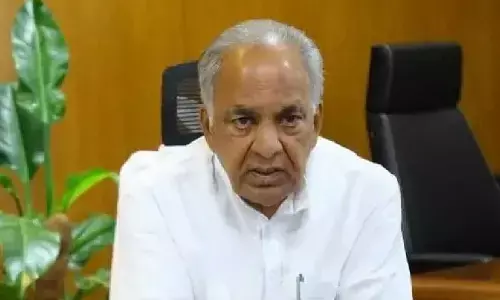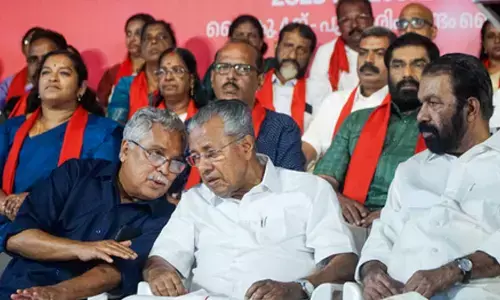Oil imports being mismanaged

Chairman of the PM’s Economic Advisory Council C Rangarajan is a man for all seasons. At least the UPA and its spin masters would have us believe that. But, in practice, in the course of the last few years of the UPA, he has acted as springboard for the unabashed neoliberal policies of team Manmohan.
The starkest example is how we deal with proposals from Iran. Under pressure, Iran’s steady diplomatic efforts continue to win over friends. Of particular interest is regaining India’s support
.jpg) Chairman of the PM’s Economic Advisory Council C Rangarajan is a man for all seasons. At least the UPA and its spin masters would have us believe that. But, in practice, in the course of the last few years of the UPA, he has acted as springboard for the unabashed neoliberal policies of team Manmohan. And whenever need arose for pushing crass pro-corporate and market-oriented reforms, Rangarajan came to head committees and task forces which invariably came with commensurate recommendations. For him objectivity and specificity of the sector he is commenting on is of little concern.
Chairman of the PM’s Economic Advisory Council C Rangarajan is a man for all seasons. At least the UPA and its spin masters would have us believe that. But, in practice, in the course of the last few years of the UPA, he has acted as springboard for the unabashed neoliberal policies of team Manmohan. And whenever need arose for pushing crass pro-corporate and market-oriented reforms, Rangarajan came to head committees and task forces which invariably came with commensurate recommendations. For him objectivity and specificity of the sector he is commenting on is of little concern.
Therefore, there was little surprise when he was pitching for an upward revision of petroleum product prices this week. He blurted the same clichéd argument-"...and as I said some domestic adjustment of oil prices is inevitable (to meet fiscal deficit target)". A fiscal fundamentalist that he is and not to mention his boss, the PM, the following sequence was also predictable -"Now the answer lies not in making the oil marketing companies suffer more; the answer lies in making suitable adjustment in domestic prices".
He was unconcerned with the implicit heartlessness of his recommendation for a vast majority of the population of this country; 94 percent of the population comprising the aam aadmi is denied semblance of social safety net. For them ‘suitable adjustment in domestic prices’ is a euphemism for increase in fuel prices and its cascading effect triggering another round of hike in prices of essential commodities. The increasing unbearability is apparent. But for Rangarajan and his horde reduction of fiscal deficit to induce investors is a far greater concern; the effect on the aam aadmi is passé.
Therefore, the myth continues; that oil prices in this country are heavily subsidized. Nothing could be further from truth. Retail oil prices in this country have three distinct components: crude oil price, refining processing and distribution costs and government taxes. The new round of price increase which the likes of Rangarajan claim have become inevitable will, however, not attempt any further tax reduction. In fact, taxes will be that much higher because it is ad valorem. The hypocrisy is so brazen; the very same dispensation which gives corporate entities lakhs of crores of tax waiver; and more in non-tax revenue which could have been earned by the government by appropriately pricing natural assets otherwise doled out for a song for making huge commercial profits, care little about inflationary impact which hurts the poor disproportionately.
The manner in which refining cost is determined is no less sinister. Though India imports crude, what is offered to the refiners both in the private and public sector is import parity at the refinery gate; meaning international refining costs are handed on a platter regardless of the cost incurred here indigenously. This represents a hefty premium on account of the difference between international refining margin charged and that incurred here in real terms. The burden of this premium is also passed on to the consumer who, due to the cascading effect, also includes the aam aadmi.
And finally, the international crude price component is most duplicitous element of the exercise in fixing the retail oil price. It is now well established that it is neither the producers nor the consumers who influence the price determinant, but global financial intermediaries who decisively shape this process. Since these entities are part of International Finance Capital, Rangarajan and his ilk accept this speculation-driven activity without a whimper. But the current threat of oil price hike arises not because of actual increase in the crude price, but dollar becoming dearer. And, no wonder; because, India imports 80 per cent of its energy needs. Exports have suffered with the bleak outlook in developed economies, while energy needs have been the biggest contributor to the bloated import bill. What is important? The downslide of the rupee is so critical that it has reached the all-time low of 68.845 to a dollar. This exacerbates the import bill and threatens further runaway inflation.
In this critical context, national interest ought to have ensured that India exercised the cheapest sourcing option. But it was not to be; because Manmohan Singh’s foreign policy of ‘enlightened nationalism’ is really a euphemism for blatant capitulation to US pressures sacrificing its own national interest at the altar of US global strategic prerequisites.
The starkest example is how we deal with proposals from Iran. Under pressure, Iran’s steady diplomatic efforts continue to win over friends. Of particular interest is regaining India’s support. India had succumbed to US pressure and voted against Iran in IAEA while referring the allegation on possible WMD manufacture to UN Security Council. But that has not dissuaded Iran from offering India deals which ought to have been major inducements from the standpoint of energy needs. Earlier, Iranian overtures to join Iran-Pakistan-India gas pipeline that could dramatically increase our energy availability were spurned by the Indian government. To deflect public attention from that, it has buckled under US pressure; Manmohan Singh government sited security reasons. However, exposing itself further, it responded positively to US-backed Turkmenistan-Afghanistan-Pakistan-India pipeline project which was proposed through a far more insecure terrain. This TAPI pipeline has been a non-starter.
To complete this sordid saga of subservience, on the question of oil sale Iran’s offer is even more lucrative. Not only is the price attractive, but India can make payment largely in rupee, thereby saving priceless foreign currency. But meekly yielding to relentless US and EU pressure and their sanctions against Tehran, India has reduced oil imports from Iran from18.1 million tonnes in 2011-12 to 13.1 million tonnes last year. Now that massive CAD and shooting import bill is staring India in the face, Petroleum Minister Moily has proposed import of additional 11 million tonnes of oil which would save foreign exchange outgo of $8.47 billion @ $105 per barrel. With higher price of international crude this could be even higher.
But Manmohan Singh, Rangarajan and the whole lot will have nothing to do with this. Making all efforts to reduce the oil price for the users to tame inflationary pressures in the economy is not an overriding concern – making people pay higher price is the preferred option.
Meanwhile Rangarajans of the world will continue to bask in their beaten track which has landed the economy in this moment of crisis. And with slowdown in GDP rates, industrial production and exports continue fall. With this bleak landscape, neoliberal policy mandarins stand exposed. Earlier these very macroeconomic fundamentals were highlighted to unleash a blitzkrieg of triumphalism. Doubtlessly, the cup of woes of the aam aadmi is full.











